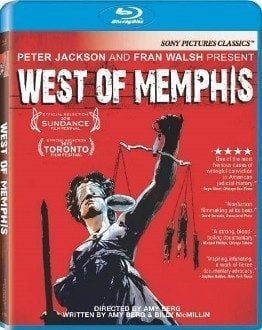Three months ago I wrote a review of the PBS documentary The Central Park Five, which chronicled how five young black men in New York City were wrongfully and shamefully convicted of a violent assault which they did not commit. At the time I felt that it was one of the worst examples of police and prosecutorial misconduct I had ever seen. Sadly, it now has to take a back seat to West of Memphis, a documentary which the late Roger Ebert called "one of the most heinous cases of wrongful conviction in American judicial history."

Studio: Sony
Distributed By: N/A
Video Resolution and Encode: 1080P/AVC
Aspect Ratio: 1.78:1
Audio: English 5.1 DTS-HDMA
Subtitles: English, English SDH, French
Rating: R
Run Time: 2 Hr. 27 Min.
Package Includes: Blu-ray
Disc Type: BD50 (dual layer)
Region: A
Release Date: 08/06/2013
MSRP: $35.99
The Production Rating: 4.5/5
Video Rating: 4/5 3D Rating: NA
Audio Rating: 4/5
Special Features Rating: 4.5/5
- "Vicki & Aaron" focuses on Vicki Hutcheson and her young son Aaron. Aaron was questioned relentlessly by the police, and like Misskelley he gave confusing and contradictory responses while being prompted by his interrogators.
- "The Confession" is a look at a legal seminar on the subject of false confessions in general and the confession of Jessie Misskelley in particular. One of the astonishing aspects of the case is that Jessie had a solid alibi for the night of the murders, but the jury disregarded it.
- "West Memphis Three Panel Discussion" is a discussion of the case among four lawyers, a writer and a West Memphis businesswoman.
- "Jeffrey Deskovic" features attorney Barry Scheck discussing how wrongful convictions occur and focuses on the case of Jeffrey Deskovic, who was arrested for murder and rape when he was 16 years old. He was coerced into making a confession after being promised that he would be allowed to go home if he just admitted that he did the crime. Deskovic eventually was exonerated when DNA testing proved that the rape was committed by a man who killed another woman while Deskovic was in prison.
- "Anything Made of Paper" contains a performance of the song by singer-songwriter Bill Carter, a Damien Echols supporter. He wanted to send something to Damien in prison, and he was told that Damien could receive anything which is made of paper - hence, the inspiration for the song.
- "Pam Revisits Crime Scene: shows Pam Dobbs, the mother of victim Stevie Branch, returning to West Memphis and visiting the crime scene in Robin Hood Hills.
- "Jury Misconduct" is a segment in which Barry Scheck discusses the fact that the jury foreman in the Echols-Baldwin trial improperly brought up the subject of the Misskelley confession during deliberations.
Overall Rating: 4.5/5
Reviewed By: Richard Gallagher
Support HTF when you buy this title:





